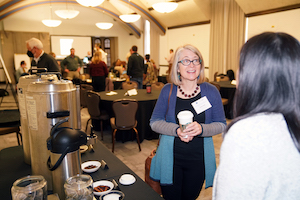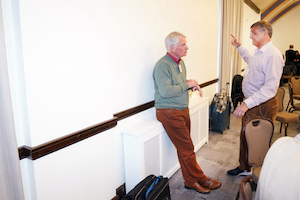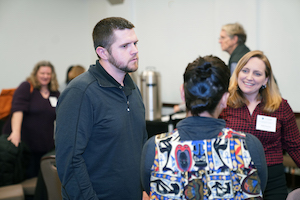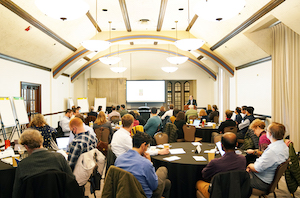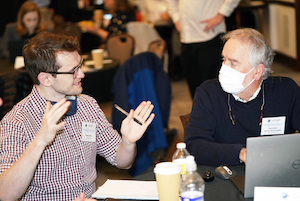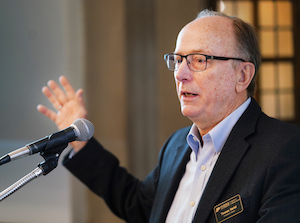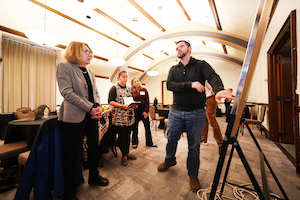Managing the Global Commons: Sustainable agriculture and use of the world’s land and water resources
Date: April 7-8, 2022
Location: PMU East Faculty Lounge, Purdue University, West Lafayette, IN
Conference Program
The conference program is available here.
List of Participants and Conference Presentations by Theme
(Click the title of the talk to download speaker slides or notes.)
|
Thomas Hertel |
Purdue University | |
|
Theme 1: Climate Change |
||
|
Matthew Huber |
Purdue University | |
|
Alex Ruane |
NASA Goddard Institute for Space Studies | |
|
Laura Bowling |
Purdue University | |
|
Maksym Chepeliev |
Purdue University | |
| Shellye Suttles | Indiana University | |
| Sisi Meng | Purdue University | |
| Uris Baldos | Purdue University | |
| Brian Cultice | Ohio State University | |
| Dominique van der Mensbrugghe | Purdue University | |
|
Theme 2: Digital Agriculture |
||
|
Vipin Kumar |
University of Minnesota | |
|
Daniel Padrao |
Solinftec Corp. | |
|
Melba Crawford |
Purdue University | |
|
Ankita Raturi |
Purdue University | |
| Jackie Boerman | Purdue University | |
| Jake Hosen | Purdue University | |
| John Evans | Purdue University | |
| Keith Cherkauer | Purdue University | |
|
Theme 3: Water Resources |
||
|
Brian Richter |
Sustainable Waters | |
|
Tara Troy |
University of Victoria | |
|
Jeff Frey |
Indiana Water Science Center, USGS | |
|
Multi-scale Analysis of Nutrient Management in the Corn Belt |
Jing Liu |
Purdue University |
| Christopher Perry | International Water Management Institute (retired) | |
| Charlotte Lee | Purdue University | |
|
Theme 4: Cyberinfrastructure for Sustainability |
||
|
Amy Walton |
CISE/Office of Cyberinfrastructure, NSF | |
|
Shaowen Wang |
University of Illinois Urbana-Champaign | |
|
Leveraging Metadata For Multiscale Data Findability, Interoperability, and Reuse |
Michael Witt |
Purdue University |
|
Venkatesh Merwade |
Purdue University | |
| Lan Zhao | Purdue University | |
| Carol Song | Purdue University | |
|
Theme 5: Ecosystems and Biodiversity |
||
|
Jeff Dukes |
Purdue University | |
|
Abhishek Chaudhary |
Indian Institute of Technology | |
|
Sylvie Brouder |
Purdue University | |
| Navin Ramankutty | University of British Columbia | |
| Alfredo Cisneros Pineda | Purdue University | |
| Jingjing Liang | Purdue University | |
|
Theme 6: Governance for Sustainability |
||
|
Stephen Polasky |
University of Minnesota | |
|
Kenneth Richards |
Indiana University | |
|
Linda Prokopy |
Purdue University | |
|
David Johnson |
Purdue University | |
| Carson Reeling | Purdue University | |
| Iman Haqiqi | Purdue University | |
| Jacob Ricker-Gilbert | Purdue University | |
|
GLASSNET Themes |
||
|
Linking global and local sustainability models with improved meso-level analysis |
Justin Johnson |
University of Minnesota |
|
Spatially explicit economic interactions within and across sub-national regions |
Elena Irwin |
Ohio State University |
|
Landing change: Top-down policy-making using bottom-up science |
Carter Brandon |
World Resources Institute |
Conference Photos
Purpose of the conference
Ensuring the long-term sustainability of our land and water resources, even as we seek to meet the world economy’s growing demands, requires informed management of the complex networks of policies, infrastructure, and technologies that connect the food and resource nexus. In addressing this challenge, a global perspective is required to determine the boundary conditions facing decision-makers as they seek to craft policies to ensure a sustainable economy and planet. The goals of the conference are: (i) to lead and to learn from other scholars, policymakers, and industry leaders engaged in the analysis of sustainability challenges at global, national, and local scales, and (ii) to identify current challenges in this space and (iii) develop a community-driven research agenda for the next 5 years that tackles those challenges using collaborative, interdisciplinary approaches that are responsive to stakeholder needs.
Motivation
The UN Sustainable Development Goals (SDGs) represent “a universal call to action to end poverty, protect the planet and ensure that all people enjoy peace and prosperity, now and into the future.” Of the 17 goals, 8 are closely tied to essential food, land, and water resources that are already under intense pressure. Can the future demands for food, fuel, clean water, biodiversity, climate change mitigation, and poverty reduction be reconciled? What are the tradeoffs of favoring one goal over others? These are challenging questions, given that sustainability in a local context is often driven by global forces, and the pursuit of the SDGs will have global consequences in addition to local and regional impacts.
Our research and engagement efforts in this arena were recognized with a Discovery Park “Big Idea Challenge Award” and applied research consortium: GLASS: Global to Local Analysis of Systems Sustainability (https://mygeohub.org/groups/glass). GLASS aims to promote world-changing researchby cultivating a global community of practice around the open-source analysis of the global-to-local-to-global (GLG) linkages underpinning global sustainability. Our hypothesis is that fine-scale analysis of the SDGs within a global framework will promote responsible public and private investment and sustainable management of critical natural resources.
Conference format
The conference will take place April 7-8, 2020. The event will cover six cross-cutting themes: climate, water, digital agriculture and machine learning, biodiversity and ecosystem services, governance, and computational approaches to sustainability. Led by members of the conference organizing committee, each theme will feature four speakers – two “local” and two outside speakers. These individuals represent a diverse set of backgrounds, including public and private sectors, NGOs as well as academia. The talks will be designed to emphasize the overarching GLG theme.
This will be a working conference aimed at producing a set of papers for a special issue of the journal Environmental Research Letters, as well as a synthesis that will ultimately be published as a review article in a leading general-interest journal (e.g., Science). In preparation for this event, the leaders are developing detailed review outlines to be shared with speakers in advance of the conference. These will give structure to each session, and these outlines will also serve as building blocks for the ensuing review article and special issue papers. Both days will include working lunches. Lunchtime rooms will be pre-assigned to ensure a mix of backgrounds at each table and will be based on the self-nominated affiliation to each of the six major themes. Each thematic group will report to the entire conference at the end of the lunch. The leaders for each theme will integrate what has been co-created during the discussions into a short summary to be presented in the final session of the conference. The conference will also include an evening reception and dinner on Thursday. When combined with the working lunches, this will provide participants with ample opportunity to network. By gathering together for an exciting conference, featuring cutting-edge, policy-relevant research, we will be in a position to chart the course for future interdisciplinary research on the global-to-local-to-global analysis of systems sustainability.

